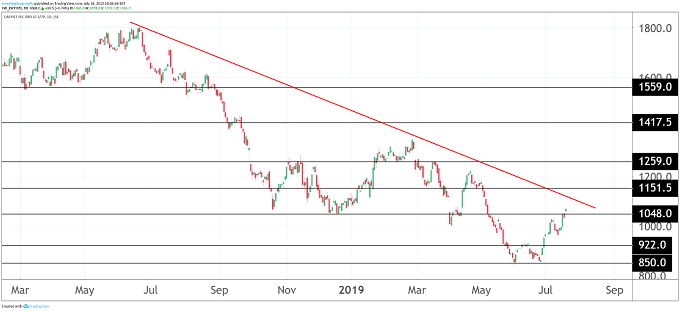Can easyJet keep recent rally going?
Up 28% in six weeks, easyJet shares still offer a 4%-plus forward yield and modest valuation.
18th July 2019 10:50
by Richard Hunter from interactive investor
Up 28% in six weeks, easyJet shares still offer a 4%-plus forward yield and modest valuation. interactive investor's head of markets brings us up to speed.

easyJet (LSE:EZJ) is pushing hard to make something of a comeback, following a torrid year which culminated in its being relegated from the prestigious FTSE 100 index.
In terms of the headlines, the total third-quarter revenue increase of 11% is a healthy result. Within that figure is a jump of 14% for ancillary revenues which, given the wafer-thin margins under which easyJet operates, is a welcome boost to its earning power.
At the same time, the company has managed to drive the cost per seat down by 4%, while the overall 8% growth in passenger numbers also played into a positive quarter. It remains to be seen whether Ryanair's recent announcement of some cuts to its flights could also hand easyJet an unexpected, but welcome gift.
In the meantime, its outlook for full-year profit remains in line with expectations, although it is likely that the figure will be between 25% to 30% lower than the previous year. Flights for the upcoming period are already 78% booked, which provides some earnings visibility.
From an investment perspective, the historic dividend yield of 5.7% (prospective yield is 4.3%) is attractive and currently well covered by earnings.

Source: TradingView Past performance is not a guide to future performance
However, the nature of the airline industry is one which is as much driven by factors outside a company's control as those which it can contain. Historically, strikes, terrorism, volcanic ash clouds and virus outbreaks, let alone weaker economic conditions, have all proved to be a drag at one time or another.
The current political climate in the UK and its departure from the European Union is now added to the list, with the potential for economic hardship and therefore a deterioration in consumer confidence also weighing on prospects.
Within the numbers, the load factor – a measurement of how well an airline fills its planes - decreased over the period (mainly due to strong comparatives following the demise of the likes of Air Berlin and Monarch), foreign exchange and fuel costs remained a thorn in the side, and competition remained intense.
Even so, easyJet is displaying a firm grip on those factors which are rather more in its control, and the key metrics - for this period at least – are being warmly welcomed.
At this point, the company's turnaround efforts are far from complete, with a 37% fall in the share price over the last year reflecting market concerns. As such, the general view of the shares as a 'hold' (albeit a strong one) is likely to remain in place until such time as easyJet can demonstrate that its current progress is sustainable.
These articles are provided for information purposes only. Occasionally, an opinion about whether to buy or sell a specific investment may be provided by third parties. The content is not intended to be a personal recommendation to buy or sell any financial instrument or product, or to adopt any investment strategy as it is not provided based on an assessment of your investing knowledge and experience, your financial situation or your investment objectives. The value of your investments, and the income derived from them, may go down as well as up. You may not get back all the money that you invest. The investments referred to in this article may not be suitable for all investors, and if in doubt, an investor should seek advice from a qualified investment adviser.
Full performance can be found on the company or index summary page on the interactive investor website. Simply click on the company's or index name highlighted in the article.